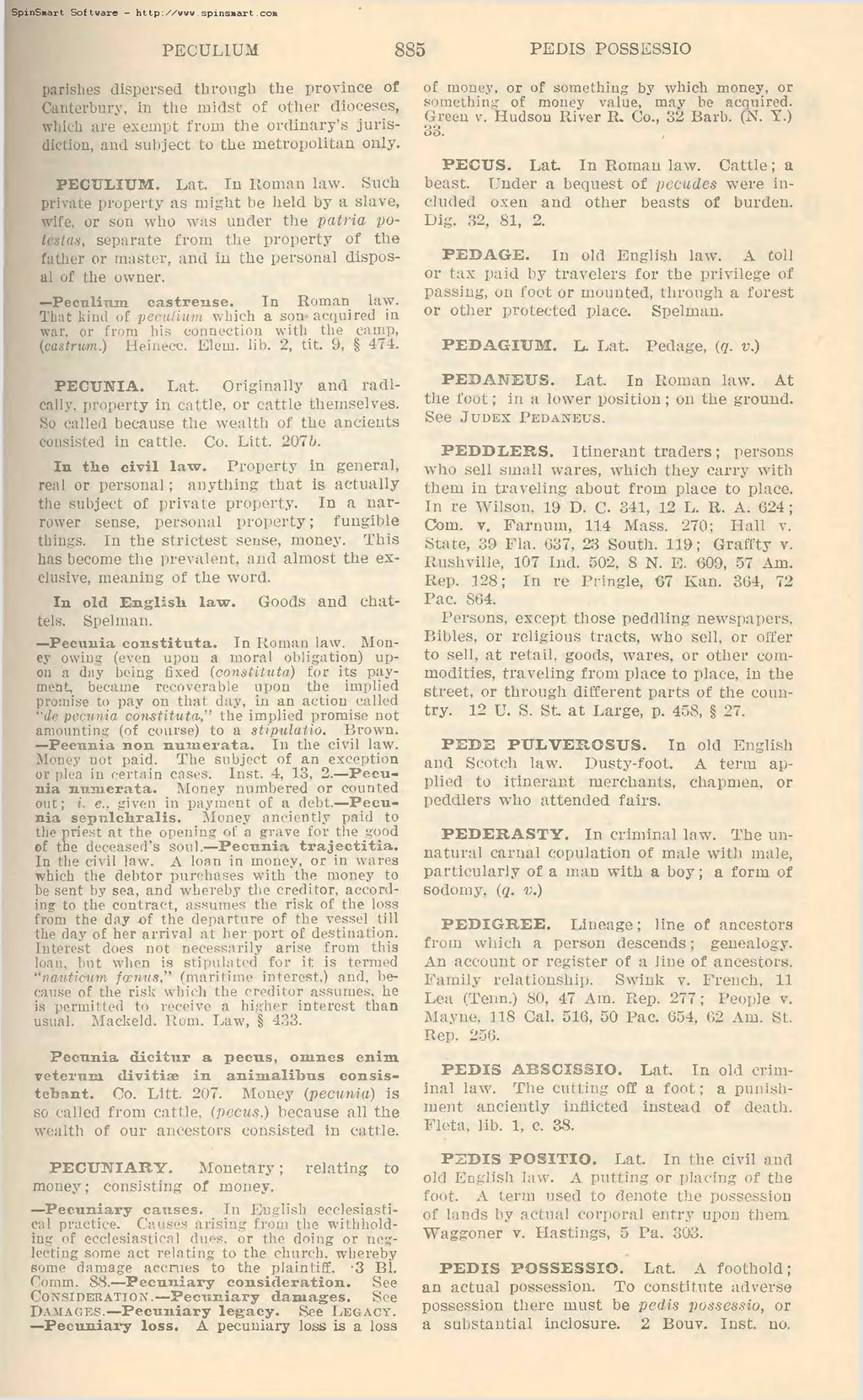parishes dispersed through the province of Canterbury, in the midst of other dioceses, which ale exempt from the urd.1nary's juris- dleflun, und subject to the metropoiit.i.n only.
PECULIUM. Lat. In Roman Law. Such 1Jl‘i\‘n[e property as might be held by a sla\ e. wife, or son who was under the putria po- I4-mu-. separnte from the property of the lhthor or master, and in the personal dispos- ul of the owner.
—Peculjnm oastrense. in Roman buy. 'i'b.Ir kind of [Jet l Iium which .11 son acquired In an, or from hi: '-onnectmn with the camp, (mzntrmn.) lzleix rut‘. Eleni. bb. 2. tit. 9. § 474.
PECUNIA. Lut. Originally and radiogll;-, pl'u[Iel‘ty in Llitie, or cattle themselves. 50 called because the wealth of the anueuts counted in cattle. Co. Litt. 2071).
In the civil law. Property in general, real or personal; anything that is actually the subject of p1'i\'nle pl.‘(>iIeltV. In a narrmver sense, personal property; funglbie things. in the strictest sense. money. This hns become the [lI'(‘.‘\1‘lit!llt, and almost the ex- clusive, meaning of the word.
In old English law. Goods and chattels. Speiinan.
—Pecu.n.ia constitutn. ln Ilonuin law. Money owinz (e\l-IIJ upon a moral obligation) upon a day being fixed (L‘l11l.S'!lIutfl) for its pay- ment. became l‘e('o\(‘l"Ibie upon the implied promise to pay on that d uy, in an action (‘nlicd ‘ do pculnin 1-anatitutrt," the implied promise not amounting (of course) to a stlpulatia. i-lrovln. —Pecnnia non znumerata. In the civil law. Mom-_v uul: paid. The subject of an exception or pics in cerlain cases. lust. 4, 13 2.—Pecunia unmex-ata. Money numbered or counted out; i c.. given in payment of a debt.—Pecunia Iepnlchralis. Money nncir-nti_\' paid to the priest at the opening of a grave for the good of the deceused's soul.—Pecunia trajectitia. In the civil law. A loan in money, or in wares which the debtor punimses with the money to be sent by sea, and whereby the creditor, nccording to the contract, iISSlll.IleS tbr- risk of the loss from the day of the departure of the vessel till the day of her arn\ai at her port of destination. interest does not necessarily arise from this luau, but when is E[iIIlli’lL(‘d for it is termed "un.u.1«-um fmunr." (maritime interest.) and, be cause of the risk which the creditor assumes. he is ‘permitted to receive a higlwr interest than usuil. Mackcid. li.Uii]. Law, § 433.
Pocunia. dicitur a pecus, omnes enim vetez-mu divitiae in animalibus consistebant. Co. Litt. 207. Money (pecunia) is so 1- tiled from cattle. (1Jcrus.) because all the we-Lltb of our an-v"toI'o consisted in cattle.
PECUNIARY. Monetary; money; consisting of money.
—Pecu.-ninx-_y causes. in English ecclesiastical practice. Can as ari lug frr 1 the withhold- in‘: of ecclesiastical tiu(«, or the doing or mu.’- lot ting some act relnting to the cllun h, wbt-reby some damage accrues to the plaintiff. -3 Bi.
relating to
(‘nu1m. S8.—Pecnuinry consideration. See (‘o1vsInn1zATroN.—1-‘ecuniary damages. SL8 DA.\nurs.—-Pecuuiim-y legacy. Ree Lneacr.
—-PecIuI.ia.ry loan. A pecuniary loss is :1 loss
885
PEDIS POSS ESSIO
of money, or of something by which money, or something: of money mine, may be acquired. gsreen v. Hudson River R. Co., 32 Barb. (N. Y.)
PECUS. Lat. In Roman law. Cattle; a beast. Lnder a bequest of pct-mics were icnluded oxen and other beasts of burden. Di£- S1. 2.
PEDAGE. In old English Low. A toil or tax paid by travelers for the privilege of passing, on foot or mounted, through E, forest or other proteeted place. Spelman.
PEDAGIUM. L. Lat. Pedage, (q. 1:.)
PEDANEUS. Lat. In Roman law. At the foot; in a lower position: on the Izround. See Junnx PEDANEU5.
PEDDLERS. ltinerant traders; persons Who sell small wares, which they carry with them in trax eling about from place to place. in re Wusou 19 D. C. 341, 12 L. R. A. 024; Com. v. Fnrnurn, 114 Mass. 210; Iiall v. State, 30 Fla. 637, 23 South. 119; Gradty v. Ilnshsiiie. 107 Ind. 502, B N. E. 609. 57 Am. Rep. 128; In re Pllngle, (57 Kan. 36-}, 72 Pac. S64.
Persons, except those peddling newspapers. Bibles, or religious ii-acts, who sell, or olfer to sell, at retail, goods, wares, or other com- modities, tro\ eling from place to place, in the street, or Lin ough different parts of the country. 12 U. St. at Large, p. 455, § 27
PEDE PULITEROSUS. In old English and Scotch law. Dusty-foot. A term applied to itinerant merchants, chapmen, or peddlers who attended fairs.
PEDERASTY. In criminal law. The unnstural carnal copulation of male with male, particularly of a man with a boy; a form of sodomy. (11. 12.)
PEDIGREE. Lineage; line of ancestors from which In person llesceude; genealogy. An account or register of a line of ancestois. Family relationship. S"-ink v. French, 11 Leo (Tenn.) 80, 47 Am Rep. 277; People V. iliayne. I18 GnL 516, 50 Pnc. 654. 62 Am. St. Rep. 2.36.
PEDIS ABSCISSIO. Lat. In old criminal law. The cutting off a foot; a punishment anciently indicted instead of death. Fletn. iih. 1, c 38.
PEDIS POSITIO. Lat. In the civil and old English law. A putting or placing of the foot. A term used to denote the possession of lands by actual corporal entry upon them Waggoner v. Hastings, 5 Pa. 303.
PEDIS POSSESSIO. Lnt. A foothold; an actual possession. To constitute ndverse possession there must be pctlis possessco, or a substantial inclosure. 2 Bouv. Inst. no.
